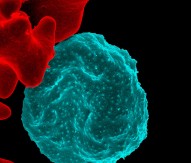
Key role for RAB3GAP complex in autophagy discovered
A research group part-funded by the European Research Council has determined the RAB3GAP complex as a novel factor that influences the efficient degradation of proteins. Neurodegenerative disorders are typically characterised by protein deposits in the brain and comprise defective, insoluble proteins which no longer fulfil their function and which cells are unable to break down.
Researchers at the University Medical Center of Johannes Gutenberg University Mainz, Germany, demonstrated that the RAB3GAP complex plays an important role in autophagy, a physiological process that breaks down cellular proteins and organelles. The team, led by Professor Christian Behl and Dr Andreas Kern, showed that the RAB3GAP complex has a decisive influence on the process of protein degradation and represents an important element of the cellular autophagy network.
Autophagy is a process in which cells digest their own components. These could be excessive or damaged organelles, such as mitochondria, invading pathogens, such as viruses or bacteria, or cytoplasmic macromolecules. Autophagy serves on the one hand for the recycling of the building blocks of cells and the provision of energy, but is also activated specifically in stress situations.
Professor Christian Behl commented: “The controlled protein degradation by autophagy is a core aspect of protein homoeostasis, which means the complex interplay between the formation, folding, and decomposition of proteins. We have extended our understanding of age-related disorders by identifying new factors involved in this process.”
Scientists found that the RAB3GAP complex promotes the formation of autophagic vesicles. These are bubble-like structures with lipid shells that envelop the substrates to be degraded. The autophagic vesicles then fuse with lysosomes, simple cell organelles, which contain digestive enzymes that break down the substrates into their component parts.
It was previously known that the RAB3GAP complex is important for the regulation of the RAB GTPase RAB3, and that it influences vesicle transport at the synapses, which are the contact points between nerve cells. The finding establishes that the complex indeed has a dual function, which is of particular relevance with regard to diseases of the nervous system.
This insight opens up possible new options for the development of therapeutic and preventative approaches to neurodegenerative diseases. The work group has published the results of its research in the specialised journal Autophagy.






